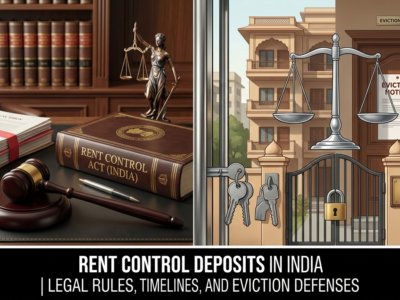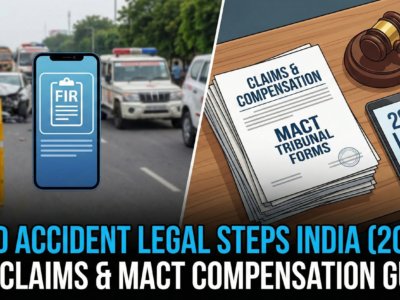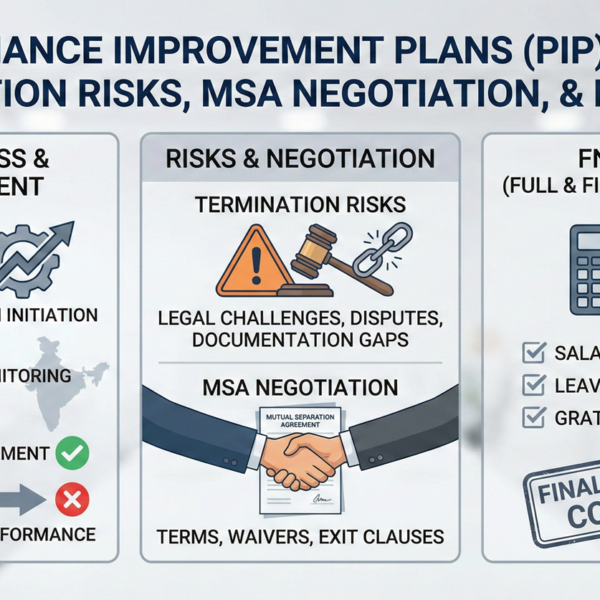Received an extra salary credit by mistake after leaving your job? It’s a common dilemma. You know the money must be returned, but you’re also waiting for your relieving and experience letters. The common advice is to hold the money as a bargaining chip.
This article explains why that is a dangerous legal trap. We cover the core legal principle of “unjust enrichment” under Indian law, the civil vs. criminal risks, and the critical tax (TDS) implications. Most importantly, we provide a safe, step-by-step strategy to return the funds, neutralize all legal threats, and secure your exit documents from a position of strength.
Mistaken Salary Credited? A Legal Guide on Your Rights and Risks in India
Our View on the Advice
We analyzed the common advice given in this situation: "keep the money and use it to bargain for your exit letters." This advice contains some correct information but is extremely risky.
- What's Correct: Receiving money by mistake is legally known as "unjust enrichment." Your employer's main option is to file a civil suit to recover the money.
- What's Misleading: The threat of a police complaint for "cheating" or "criminal breach of trust" is often used as a pressure tactic. A successful criminal case is very unlikely if you did not act dishonestly.
- What's Risky: The suggestion to link the repayment to receiving your exit letters is a legal trap. This action could be used by your employer as proof of "dishonest intent." It could also give them a valid legal reason to withhold your documents.
A safer approach is to 'decouple' the issues. You should immediately and unconditionally offer to return the mistaken payment. This establishes your good faith. From this stronger legal position, you can then firmly pursue your separate right to your exit documents.
Mistaken Payments: A Civil Liability
The core legal principle here is "unjust enrichment." This means no person can keep a benefit or gain at another's expense without a valid legal reason. The employer's mistake does not give you a right to the money. Your receipt of the funds creates a legal duty to return them.
Infographic: The Path of Unjust Enrichment
1. Employer's Mistake
An accidental overpayment occurs.
2. Unjust Enrichment
You receive funds you did not earn.
3. Legal Obligation
The law implies a duty to return it.
The Legal Basis: Section 72, Indian Contract Act, 1872
This situation is directly covered by Indian law. Section 72 of the Contract Act states: "A person to whom money has been paid... by mistake... must repay or return it."
This is not a traditional contract. It is a "quasi-contract" or "contract implied-in-law." The law creates this obligation to ensure fairness. The employer's primary legal path is to file a "civil recovery suit" to get the money back. In court, their case would be very strong.
Can You Be Criminally Charged?
Many people worry about a police complaint. It's important to understand the difference between a civil wrong (like this) and a criminal act. A civil wrong is about repaying a loss. A criminal offense requires a "guilty mind," known in law as *mens rea*.
Courts generally resist attempts to turn civil money disputes into criminal cases. For your action to be a crime, you must have a "dishonest intent." Your current plan to repay the money is your best legal defense, as it proves you have no guilty mind.
No "Guilty Mind" (Civil Matter)
You discover the error and immediately offer to return it. This action negates any claim of dishonest intent. This remains a simple civil dispute.
Potential "Guilty Mind" (Criminal Risk)
You knowingly keep the money, refuse to return it, or use it as a bargaining chip. This action could be used as evidence of "dishonest intent."
Why "Cheating" (IPC 415) Unlikely Applies
"Cheating" requires two things: 1) Deception, and 2) Dishonestly *inducing* someone to deliver property. You did not deceive or induce your employer to make the payment. It was their internal error. An argument that you later "induced" them to let you "retain" it by refusing to pay is weak, as it lacks the initial deception.
Why "Criminal Breach of Trust" (IPC 405) Fails
"Criminal breach of trust" has an even higher standard. It requires: 1) "Entrustment" of property, and 2) "Dishonest misappropriation." The employer's claim fails on the "entrustment" requirement. Entrustment is a voluntary and knowing act of placing property in someone's care. A *mistake* is the exact opposite of entrustment. You were not "entrusted" with the extra funds.
Can Your Employer Recover the Money?
Yes. An employer has an established legal right to recover wages paid in error. This right continues even after your employment ends. They can ask for direct repayment or file a civil suit.
The *Rafiq Masih* Case: Exceptions to Recovery
The Supreme Court, in *State of Punjab vs. Rafiq Masih*, did set some exceptions where recovery of excess payment would be unfair. These exceptions generally protect:
- Low-level employees (Class-III and Class-IV).
- Retired employees or those close to retirement.
- Cases where the payment was made over five years ago.
- Other situations where recovery would be harsh or arbitrary.
These exceptions are based on equity, protecting an *innocent* employee who received the payment in good faith and may not have known it was an error.
Why These Exceptions Likely Do Not Apply to You
The *Rafiq Masih* case likely does not protect you in this situation. The key reason is that you are *aware* of the mistake. By knowingly keeping the funds after this discovery, you lose the "good faith" protection that is central to the Supreme Court's exceptions. You remain under the strict legal duty of Section 72 to return the money.
Employer's Perspective: Best Practices for Recovery
While this article focuses on the employee, it is useful to understand the employer's correct legal and professional process. An employer who acts with transparency is more likely to recover funds without dispute.
- Internal Audit: First, the finance or HR team must confirm the exact amount and nature of the error. They should document how the mistake occurred.
- Formal, Professional Communication: The employer should contact the employee in writing (email is best). This communication should be polite and state the facts of the error, not make threats.
- Provide Clear Options: The employer should offer clear solutions, such as a direct bank transfer or, if applicable, a deduction from the pending Full and Final (F&F) settlement.
- Manage Tax Adjustments: The employer is responsible for adjusting their TDS (Tax Deducted at Source) returns and ensuring the employee's Form 16 is corrected to reflect the *actual* income paid.
- Review Internal Controls: After resolving the issue, the employer should review their payroll process to prevent future errors.
When an employer resorts to threats of police action, it often signals a weak internal process and can needlessly escalate a simple civil recovery matter into a dispute.
Are Relieving Letters a Legal Right?
Your desire for your exit documents is valid and legally supported. While no single central law *mandates* a relieving letter, your right to an experience certificate (or "service certificate") is often protected by:
- State Laws: Many state Shops and Establishments Acts require employers to provide a service certificate.
- Unfair Labour Practice: Withholding these documents *without a valid reason* is widely seen as an unfair labour practice and can be challenged.
- Contractual Obligation: Your own appointment letter or the company's HR policy often creates a contractual duty for the employer to provide these documents.
How to Get Your Documents (If Withheld)
If your employer refuses to issue the letters *after* you have cleared all your dues, you have a clear escalation path:
- A formal written demand to HR.
- A formal legal notice from a lawyer (this is often very effective).
- A complaint with the state Labour Commissioner.
- A case in the Labour Court (for "workmen") or a civil suit for damages and "specific performance" (for managers).
Interaction with Full & Final (F&F) Settlement
If the overpayment is discovered *before* your Full and Final (F&F) settlement is processed, the situation is simpler. The employer has a clear "right of set-off."
This means they can legally deduct the overpaid amount from the total money they owe you (which might include your final salary, unused leave encashment, or gratuity, if applicable). This is the most common way such errors are handled.
Your Right in an F&F Deduction
If your employer does this, you are entitled to a clear and itemized F&F statement. This document must explicitly show:
- The total amount payable to you.
- The exact amount of the overpayment being "set-off" or "deducted."
- The final net-payable amount after the deduction.
This statement is your proof that the overpayment has been settled. If the F&F statement is not clear, you must email HR and request a revised version that explicitly lists the recovery of the mistaken payment.
The Critical Tax & TDS Question
A major complication is tax. Your employer already deducted TDS (Tax Deducted at Source) on the *entire* mistaken salary and paid it to the government. This creates a problem: if you repay the full (gross) amount, you are paying back money (the tax) that you never received.
Who is Responsible for the Tax?
The legal responsibility for correcting this rests with the employer. Here is the correct process:
- You Repay the Net Amount: You are only obligated to return the "in-hand" or *net* amount that was credited to your bank account.
- Employer Adjusts TDS Returns: Your employer must then file a revised TDS return for that quarter. This will show the reduced salary payment and allow them to claim a refund or adjustment from the tax department for the excess TDS they paid.
- You Must Get a Corrected Form 16: This is the most important step for you. You must ensure your employer issues you a corrected Form 16 that reflects your *actual* final salary, *after* the repayment. If they fail to do this, your Form 16 will show a higher income than you actually retained, leading you to pay excess income tax when you file your ITR.
Do not accept an arrangement where you repay the gross amount and are told to "claim it back on your ITR." The process is for the employer to correct their TDS filing and your Form 16.
The Negotiation Trap: Why Linking Payment to Letters Fails
The advice to create a condition ("I will pay *if* you give me my letters") is flawed. It improperly links two separate legal issues. This tactic is not just weak; it is dangerous.
Infographic: Comparing Strategies
RISKY: The "Linked" Tactic
Action: Withhold payment as a bargaining chip.
Risk 1: You *create* evidence of "dishonest intent," strengthening their criminal complaint.
Risk 2: You *give* the employer a valid legal reason ("pending dues") to withhold your letters.
Outcome: A "lose-lose" situation. You are forced to pay *and* still have to fight for your letters from a weak position.
SAFE: The "Decoupled" Tactic
Action: Immediately offer to return the money. Separate the issues.
Benefit 1: You create a written record of your good faith, which *negates* any criminal claim.
Benefit 2: The employer *loses* their only valid reason to withhold your letters. Their refusal becomes a clear "unfair labour practice."
Outcome: A "win-win" path. You resolve the money issue and fight for your letters from a position of legal and moral strength.
Strategy Comparison Table
| Consequence | Risky "Linked" Tactic | Safe "Decoupled" Tactic |
|---|---|---|
| Status of Money | Becomes "pending dues." You are in breach of an obligation. | Liability is cleared. You have "clean hands." |
| Criminal Risk | HIGH. Creates evidence of "dishonest intent." | MINIMAL. Creates proof of good faith. | row-span-wrap-word
| Exit Letter Status | WEAK. Employer gains a valid reason to withhold them. | STRONG. Employer loses all valid reasons to withhold. |
| Legal Position | "Unclean Hands." | "Clean Hands." |
A Recommended Strategy: The Decoupling Principle
Employee Action Plan: A Visual Guide
1. Discover Error
Review bank statement. Do not spend the money.
2. Inform Employer
Send proactive email (Template 1) to create a good-faith record.
3. Arrange Repayment
Return the *net* amount via transfer or F&F deduction. Get confirmation.
4. Secure Documents
Send separate request (Template 3) from a position of strength.
We recommend you *decouple* the two matters. Treat them as two separate tasks. First, fix the issue where you are in the wrong (the overpayment). Second, pursue the issue where your employer is in the wrong (the withheld letters).
Track 1: Returning the Overpayment (Templates Included)
Your first step is to create a written record. This email is your legal shield. It proves your good faith and neutralizes any criminal allegation.
Template 1: Initial Email to HR/Finance
Subject: Mistaken Salary Credit - [Your Name] - [Your Employee ID] Dear [HR/Finance Manager Name], While reviewing my personal bank statements, I identified a credit of [Amount] on [Date], which appears to be an administrative error resulting in a salary overpayment. Could you please confirm this from your end? If it is an error, please provide me with the company's bank account details and a reference code so that I may return these funds. I would like to resolve this matter at the earliest. Best regards, [Your Name]
After they reply and you make the transfer, send a final email to close the loop.
Template 2: Confirmation of Repayment
Subject: Re: Mistaken Salary Credit - [Your Name] - [Your Employee ID] Dear [HR/Finance Manager Name], For your records, I have transferred the full amount of [Amount] back to the account you provided. The transaction reference number is [Your Transaction ID]. I now consider this overpayment matter fully resolved. Please also confirm that this returned amount will be correctly reflected in my final tax statements (Form 16) to avoid any future tax discrepancies. Best regards, [Your Name]
Track 2: Recovering Your Documents
*After* you have confirmation that the money issue is closed, send a *separate* email to HR. You are now in a position of maximum strength.
Template 3: Formal Request for Exit Documents
Subject: Request for Relieving Letter and Experience Certificate - [Your Name] - [Your Employee ID] Dear [HR Manager Name], Following the completion of all my exit formalities on [Your Last Working Day], and having resolved all outstanding financial matters (including the recent overpayment which I have returned), I am formally writing to request my exit documents. As I have no pending dues or obligations to the company, please issue my relieving letter and experience certificate. I would appreciate receiving these documents by [Date, e.g., end of this week]. Thank you, [Your Name]
If the employer still delays, you can confidently escalate the issue, first to senior management and then, if needed, with a legal notice. Your lawyer will be able to show that you are an honest ex-employee who is being wronged by an employer engaging in an unfair labour practice.
Frequently Asked Questions (FAQ)
Q: What happens if I already spent the money, believing it was part of my settlement?
A: You are still legally obligated to repay it under Section 72 of the Contract Act. The "good faith" defense of *Rafiq Masih* is meant for those who did not know it was an error (e.g., a small, unnoticed pay increase over years). If you recognized it was a large, mistaken lump sum, the law requires you to repay. You should immediately contact your employer, explain the situation, and negotiate a reasonable repayment plan. Honesty is the best policy.
Q: Can my employer just deduct the amount from my Full and Final (F&F) settlement?
A: Yes. This is the most common and legally simplest way for an employer to handle this. If your F&F settlement is still pending and has sufficient funds, they have the right to set-off the mistaken payment against the dues owed to you. They must provide you with a clear, itemized statement showing this deduction.
Q: Realistically, how likely is a police complaint?
A: A police complaint is a *pressure tactic*, not a genuine legal threat in 99% of these cases. As explained, the elements of a crime like "cheating" or "breach of trust" are missing. The police are also generally reluctant to get involved in what is clearly a civil financial dispute. However, this threat becomes *more* real if you act dishonestly—for example, if you stop replying, block their calls, or explicitly state you will not return the money. By being proactive and professional, you make this risk disappear.
Q: How long does an employer have to issue exit letters?
A: While there is no single law setting a fixed deadline (like "48 hours"), the general expectation is "within a reasonable period." Most companies aim to provide it with the F&F settlement, which can take 30-45 days. If it goes beyond this, and you have no pending dues, their delay becomes unreasonable and can be legally challenged as an unfair labour practice.









